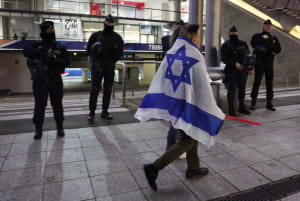CIA head says Hamas leader Sinwar under increasing pressure from group's military commanders to accept ceasefire over Gaza destruction
Netanyahu also faces pressure over ceasefire deal, but from two opposing groups

CIA Director Bill Burns told participants at an off-the-record conference he believes Hamas leader Yahya Sinwar is under increasing pressure from the terror groups' military commanders to accept the ceasefire agreement and release the Israeli hostages to end the war in Gaza.
Burns spoke at the Allen & Company summer retreat in Sun Valley, Idaho, sometimes referred to as a "summer camp for billionaires" due to its high-profile guest list including government, media and tech executives.
Burns, who has been trying for months to negotiate a ceasefire on behalf of the administration of U.S. President Joe Biden, said both Israel and Hamas leaders need to take advantage of this moment and agree to a ceasefire.
Biden has faced increasing internal pressure from party Democrats to rein in Israel’s nine-month conflict against Hamas, especially during an election year, when younger leftist voters appear to be significantly opposed to Israel.
The comments were made by an unnamed attendee at the presentation made by Burns.
The CIA director reportedly said U.S. intelligence officials are convinced Sinwar is hiding in tunnels beneath his hometown of Khan Younis, having returned there after the IDF withdrew its troops before the Rafah incursion.
U.S. officials also estimate that internal pressure from senior Hamas military commanders has increased in recent weeks, as Israel has reached several important goals.
The IDF seizure of the Rafah crossing and the Philadelphi Corridor has allegedly cut off any ability for Hamas to resupply weapons and ammunition. In addition, recent operations in northern and central Gaza have reportedly eroded Hamas’ attempts to reestablish itself in those locations.
If the airstrike targeting Mohammed Deif on Saturday was successful, it means that two of Hamas’ most important and experienced military leaders and strategists have been eliminated, further weakening the terror group’s ability to mount a meaningful resistance against the IDF.
Qatari mediators assured Israeli officials that negotiations for the hostage release would continue despite the attack, but the Israeli negotiating team has not yet left for Qatar.
Mossad Chief David Barnea was expected to leave for Qatar on Sunday, however, following the initial announcement by a Hamas source that the negotiations had been halted, he has not yet departed. Another Hamas official later denied claims that the terror group had halted the negotiations.
A diplomatic source told Ynet, “Israel is in contact with the mediators and is coordinating this. It is not certain that it will be the head of the Mossad, nor if it is safe in Qatar. The prime minister's approach of military pressure and firm adherence to negotiations within the framework of red lines advances both goals: the release of the hostages and the other goals of the war.”
Prime Minister Benjamin Netanyahu faces significant pressure both internally and externally over the hostage ceasefire deal.
Many of his political opponents, and a large number of the hostage families, want the prime minister to agree to a ceasefire deal, no matter the cost, while a significant number of his coalition allies and a small group of hostage families say he should not let up the military pressure on Hamas until all of Israel's war goals are achieved.
We recommend to read:

The All Israel News Staff is a team of journalists in Israel.














